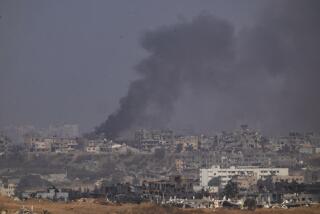Arrest Warrants Issued for 6 in Spain Bombing Case
- Share via
MADRID — Spanish authorities issued international arrest warrants Wednesday for six fugitives in last month’s train bombings as the investigation focused on possible masterminds and recently arrested suspects believed to have longtime ties to extremism here.
Judge Juan del Olmo issued the warrants for five Moroccans and a Tunisian implicated in the bombings that killed 191 people March 11, court officials said. Three of the wanted men have relatives among the 21 detained suspects, whom police describe as a mix of hard-core extremists, recently recruited criminals and members of three families.
Police have developed a detailed picture of the plot through interrogations as well as fingerprints and other evidence found in a rural safe house outside Madrid where the planning and the assembly of the bombs is believed to have taken place. The people already in custody are suspected of being top plotters, several bombers and the alleged bomb maker, a Moroccan with a university degree in chemistry who trained at an Al Qaeda camp in Afghanistan, police say.
Most of the suspects are Moroccan, but arrests during the last week netted five of Syrian descent, including two longtime associates of a Syrian-dominated Al Qaeda cell dismantled here in late 2001, according to authorities and court documents. One is a relative of a businessman charged last year with filming a 1997 “reconnaissance” video of the World Trade Center linked by police to the Sept. 11 attacks, said a high-ranking Spanish investigator who requested anonymity because of the sensitivity of the investigation.
Nonetheless, the question of who conceived and ordered the sophisticated train bombings still bedevils investigators.
The trail seems to lead to the Moroccan Islamic Combatant Group and the network of a fugitive Palestinian Jordanian named Abu Musab Zarqawi, both part of the Al Qaeda alliance, police said. But the increasing autonomy of Islamic terrorist cells makes identifying a “mastermind” in the traditional sense difficult, investigators said.
“It’s logical that the order came from a top leader,” the high-ranking investigator said. “But it’s all deduction, speculation. Direct ties to top people haven’t come out yet. We know we have important people in custody. But we are looking for others who are important.”
This week, Interior Minister Angel Acebes singled out the Moroccan Islamic Combatant Group as a main target. Lead suspect Jamal Zougam, a Madrid shopkeeper, has ties to central figures in that organization, according to Spanish and French investigators.
But Mohammed Guerbouzi, who is wanted by Morocco as a founding member of the extremist group, remains free in Britain, European investigators say. As in the cases of other alleged Islamic ideologues, Guerbouzi has British citizenship and British police believe they lack the evidence to arrest him, said a top French anti-terrorism official who requested anonymity. But British police say they are investigating “definite” connections between the Madrid attacks and London.
The Madrid bombings also caused police to renew their scrutiny of Zarqawi, whose network extends across Europe and the Middle East into Iraq, where U.S. officials allege he has led a campaign of suicide attacks. Zougam and others have ties to Zarqawi via a Moroccan named Amer Azizi, who fled Spain in 2001 before police could arrest him as an alleged accomplice of the Sept. 11 plotters.
Azizi, who Spanish police say was detected through telephone intercepts last year in Iran with Zarqawi, is the kind of seasoned, mid-level figure who could have played an intermediary role between operatives here and leaders elsewhere, investigators say.
“There is a connection indirectly to Zarqawi through Azizi,” the Spanish investigator said. “Jamal and several others are followers of Azizi.”
French investigators, who are assisting the inquiry and had identified Zougam as an Islamic extremist in the late 1990s, also see a potential tie to Zarqawi. But like Spanish officials, they hasten to point out that the plot also may have been hatched and executed by relatively obscure extremists.
Like Zougam, two Syrians arrested recently were already known to Spanish authorities.
One is Baset Ghalyoun, a laborer jailed this week based on witness testimony that he was aboard one of the bombed trains. The investigator said Ghalyoun is a distant relative of Ghasoub Abrash Ghalyoun, who awaits trial on charges related to extensive video footage of the World Trade Center he shot during a trip to New York in 1997 as part of suspected reconnaissance for Al Qaeda. The recently jailed laborer was investigated for suspected ties to Islamic extremism several years ago but not arrested at the time, the investigator said.
The second Syrian already known to police was Walid Masri, who will be questioned today by Judge Del Olmo. He was identified as “a longtime follower” of the accused leader of the Al Qaeda cell here as far back as 1998, according to court documents. Masri also surfaced in wiretapped phone calls in 1998 and 1999, the documents show.
Times staff writer Rotella reported from Paris and special correspondent Mateo-Yanguas from Madrid.
More to Read
Sign up for Essential California
The most important California stories and recommendations in your inbox every morning.
You may occasionally receive promotional content from the Los Angeles Times.












